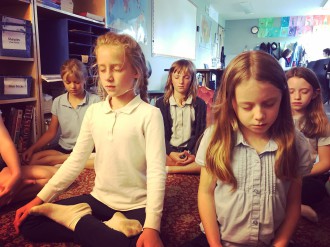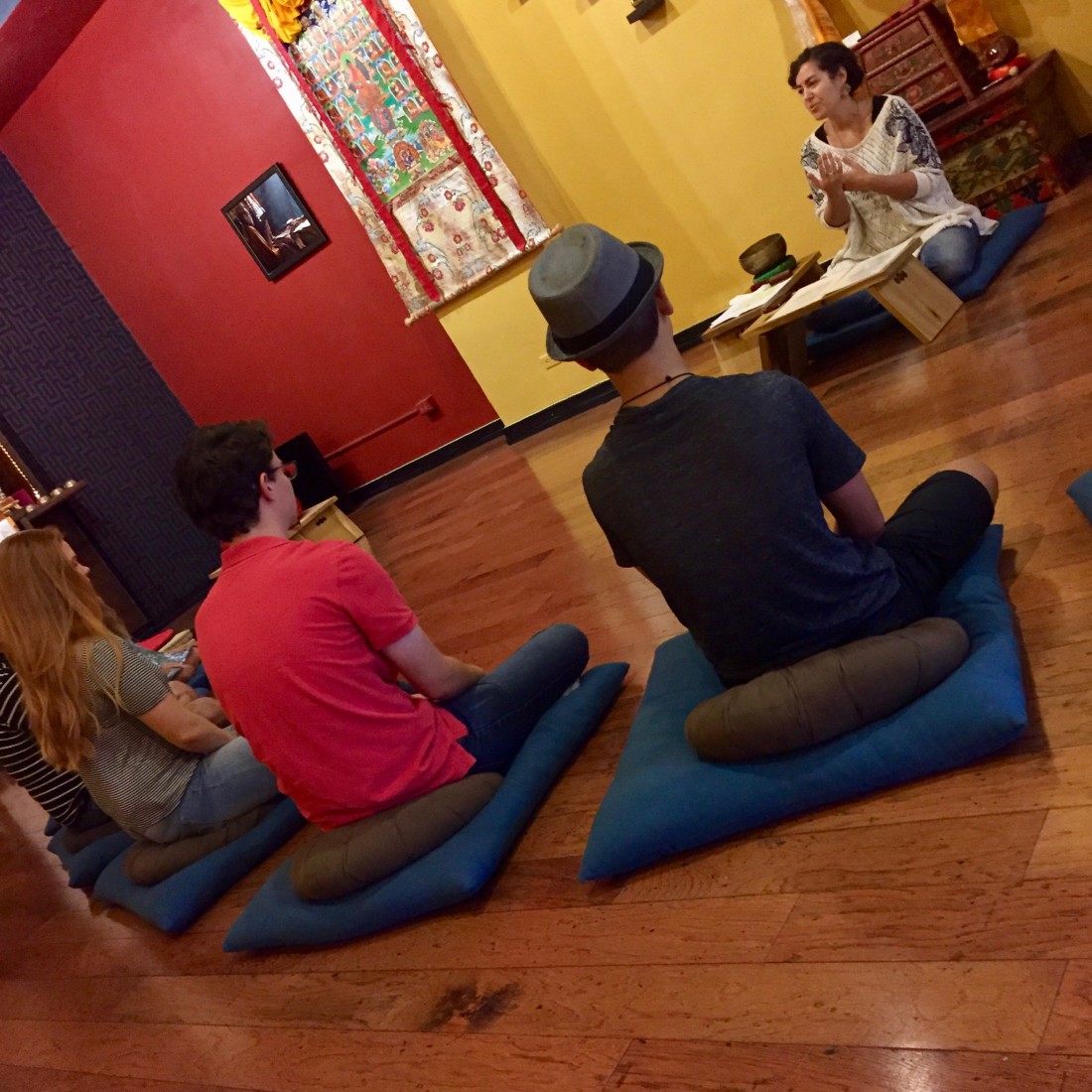The benefits of meditation for adults are well-researched and supported by science. Improved cognition, decreased anxiety and increased focus are just a few of meditation’s touted effects. The research on children’s meditation isn’t as plentiful, but studies have shown that kids, too, can reap the benefits of “quieting the mind.” Asheville parents and teachers are seeking out ways to introduce their children and students to these techniques.

In 2013, meditation and kindergarten teacher Elise Cross attended a teaching given by the Dalai Lama in Louisville, Ky., with her husband and two young daughters. “He spoke on the increased need of adding secular ethics to our education system,” says Cross. “He explained how we’re focused on material goals but not necessarily teaching kindness and warm-heartedness.”
As a kindergarten teacher at The New Classical Academy in Asheville and kids meditation teacher at Urban Dharma, Cross resonated with the Buddhist leader’s words. “I became much more intentional with how I could incorporate these lessons in the classroom and into [the Urban Dharma] children’s program,” she says.
Cross has been teaching her monthly Meditation for the Young class at local Tibetan Buddhist center Urban Dharma for the past two years. The class, which varies by age group, is offered in conjunction with Jubilee!, a local faith community.
Cross doesn’t expect her young students to practice meditation in the same ways that adults do, saying it isn’t realistic or effective to expect kids to sit and be quiet for long stretches of time. “Instead, I try to point out how mindfulness is relevant in their lives and the importance of having the ability to not get carried away by emotions,” she says. “We talk about how we’re exercising and training our minds, working toward being able to act from this calm state when we’re in the midst of chaos or a challenging situation.”
A typical class includes several exercises and often begins with a body awareness and breath meditation. “Drawing the attention to the body and breath helps calm the mind and draw their awareness to the present,” says Cross. She also directs the children in visualization activities and guided meditations aimed at building compassion toward themselves and others.
“Meditations for kids should be kept brief so they can feel successful and enjoy the experience,” says Cross. With this in mind, she will break up the meditation exercises with stories that focus on secular humanist ethics, followed by discussion.
Even with adjusted expectations for young meditators, Cross is struck by how kids respond to the practice. “Even the most energetic kids have been able to achieve a pretty impressive level of calm and quiet in a fairly brief amount of time,” she says.
Vicki Garlock is the nurture coordinator at Jubilee! Community Church. She works with Cross to introduce the children at Jubilee! to other faith-based traditions. But she points out that meditation and mindfulness don’t have to be religious in nature. “Many activities can be ‘mindful,’ and it’s becoming harder and harder to maintain boundaries between faith-based meditative practices and more secular mindful practices,” says Garlock. “Regardless of motivations, many activities — like making crafts, praying or even stretching — can be mindful, and perhaps even meditative, if they are done in a quiet and reflective manner.”
For Garlock, it’s very important that the kids at Jubilee! experience quiet and stillness, especially in our distracting, even chaotic, world. “All that noise can prevent us from getting in touch with the truest part of ourselves,” she says. “Silence and stillness help us access those places deep within us that are often masked or hidden from view.”
James Dougherty, who studied under a Tibetan lama and practices meditation as a Buddhist, takes his 9-year-old granddaughter Lilly to Cross’ class regularly. Mindfulness meditation does not conflict with one’s religion, he says. “It is unfortunate that people think it will brainwash their kids, or it’s strictly a religious practice,” says Doughterty. “The classes Elise teaches are secular, with lots of stories and activities.”
Furthermore, says Dougherty, the effects of meditation on his granddaughter are evident. “It is a process, but I did see an immediate improvement in Lilly’s attitude toward others, and she was a calmer child,” he says. “Study after study has confirmed that adults who meditate have more clarity, are happier, have less addiction problems, are better able to avoid conflict, are more successful, have fulfilling relationships. Translate this to kids, and they do better in school, are more contented, have less behavioral issues, have more fulfilling friendships and grow up more balanced.”
Kimberly Mason volunteers at the Unitarian Universalist Congregation of Asheville, where she teaches Neighboring Faiths, a class in which she and her students explore other faith traditions. It was through this program that she met Cross. Mason’s 5-year-old daughter, Libby, practices mindfulness as part of of her kindergarten curriculum at Isaac Dickson Elementary.
Mason says her daughter practices a type of mindfulness practice at home called loving-kindness meditation, using it as a prayer before dinner. In this practice, the practitioner repeats the words, “May I be safe, may I be happy, may I be healthy, may I live with ease,” eventually replacing the “I” with “you.”
“It is really lovely,” says Mason. Sitting meditation is less interesting to the active 5-year-old, but Mason tries to add it in small doses. “I do encourage her to join me in ‘sitting in silence’ for a minute or two, and that is about all she can handle,” says Mason. “But I think it’s worth my persistence because the benefits are so great and so well-established. So we try just brief sittings (a minute or two), and then we talk about why this is good for our brains.”
Mason imagines that sitting meditation may come later for Libby, but in the meantime, she is happy to keep incorporating the mindfulness practices she has learned into her home routine. “I think meditation is an antidote to stimulation addiction that is pretty widespread these days,” says Mason. “It helps us regain control of our attention and focus, so that we are not at the mercy of our emotions and cravings. It’s easy to see how this can lead to more success in relationships, school, job performance and just about every aspect of life.”



Meditation and Mindfulness are essential life skills that have tremendous benefits for everyone in every area of life. Learning and grades improve as well as critical thinking skills. I teach every one of my university students mindfulness and meditation. We begin every class with a short meditation. It makes a huge difference for the students. Reducing stress and increasing self-awareness through meditation and mindfulness is the best preventive therapy available. But there is also something intangible that can occur when meditating that causes a ‘shift’ in one’s reality to a more positive life experience. I can only recommend getting started and staying with meditation and seeing what the results are. Sometimes it is not possible to attend a class but it is often it is helpful to have some instruction for meditation. I usually suggest they start with these two guided mindfulness training mp3s, Meditation 1 and Meditation 2 by Jon Shore at http://www.meditation-download.com. Shore produces many others as well for different purposes. It takes consistent practice but the results are well worth the small effort required.